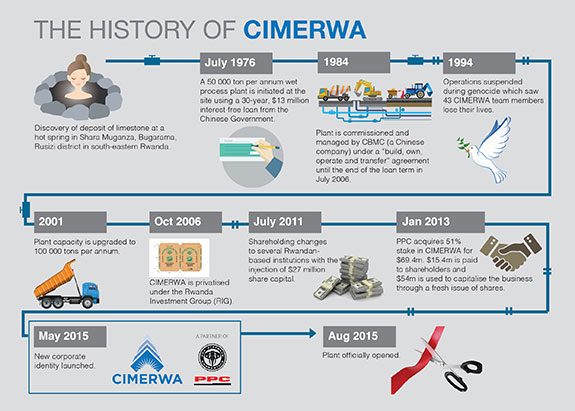Partnering for sustainable development in Rwanda: part one
A deposit of limestone discovered at a hot spring in Rusizi District, Bugarama – a small town in southwestern Rwanda – several decades ago has recently become the primary catalyst behind the construction of a new plant by CIMERWA: a 600 000 tpy cement plant with a five-stage precalciner kiln. Majority-owned by South Africa’s largest cement company, PPC Ltd, in partnership with government and private sector stakeholders, the plant is unlocking the potential of the area through its focus on excellence and sustainability.
As Africa’s economic growth trajectory continues upward, its critical need for infrastructure development mirrors this path. Countries across the continent are working to deliver on this need, as evidenced by the net worth of mega-projects across the continent growing by a staggering 46.2% in 2014 alone (as per the recent African Construction Trends Report compiled by Deloitte). Mega-projects require mega-resources, however, including construction materials such as cement. These resources also need to be manufactured and supplied locally wherever possible in order to reduce production costs, boost local economies and ensure sustainable job creation.
With many African countries calling for partners to enable this growth, PPC Ltd’s investment in the CIMERWA plant in Bugarama, Rwanda provides a compelling case study as to the viability of this type of long-term collaboration.
Based on an initial engagement, which began three years ago in mid-2012, PPC acquired a 51% stake in CIMERWA for US$69.4 million in January 2013. Little more than two years later, the new state-of-the-art plant was commissioned in July 2015 and officially opened by Prime Minister Anastase MUREKEZI the following month. The plant is expected to reach full capacity output of 600 000 tpy during 2018. As such, the Bugarama facility stands to significantly stimulate both the national and regional economies through the scale and output of its production line.

Addressing Africa’s infrastructure problem-statement: positioning Rwanda in the African growth story
Over the past decade, economic growth across Africa has trebled. RMB’s latest Where to do Business in Africa Report supports this extraordinary statistic in further noting that the continent has the fastest urbanisation rate globally. Within this context of rapid development, Rwanda’s own urban population is set to double by 2017 and, consequently, accommodation and associated infrastructure are critically needed.
Growth in Rwanda’s infrastructure and building industry was previously made possible by imports, specifically regarding cement. The construction and operation of the new CIMERWA facility thus holds substantial benefits for business and the country, not only as a result of the low-cost self-manufacture of cement now being boosted, but also by opening export markets. This world-class facility is therefore a game-changer for Rwanda, particularly considering the viability of the export markets of Burundi and Eastern DRC due to their close proximity.
In addition to the above it must be noted that Rwanda is investor-friendly: the 2014 WEF Global Competitiveness Index Report ranks it as the most competitive place to do business in East Africa, and the country also ranks third overall in the broader African competitive index. Its national economy has grown on average by 6.9% y/y over the past five years.
While adding value to Rwanda’s expanding economy, the Bugarama facility also showcases PPC’s Pan-African, context-specific approach to partnering for expansion. In addressing present demand and simultaneously providing for anticipated growth, the facility will extend CIMERWA’s production capacity from its previous 100 000 tpy to 600 000 tpy.
PPC’s Pan-African perspective
PPC has an extensive footprint in Africa and is fully represented in seven countries with factories, blending facilities, milling and ready-mix batching plants located across Sub-Saharan Africa in particular. The company has invested significantly in Pan-African projects over the past four years, ensuring the reliable provision of quality, world-class materials and related solutions across the continent.
In delivering on its commitment to sustainability, PPC works to find innovative local solutions to local challenges – specifically through partnerships. The company has consequently dedicated itself to building an environment that supports sustainable innovation within companies and communities across African borders. This approach is based on the realisation that Africa’s growth needs demand innovation across the full construction value chain: from planning to materials, manufacturing techniques, funding and sales. To this end, Africa has to find – and is finding – new solutions that match its own uniqueness.
This is part one of a three-part article written for World Cement’s December issue and abridged for the website. Subscribers can read the full issue by signing in, and can also catch up on-the-go via our new app for Apple and Android. Non-subscribers can access a preview of the December 2015 issue here.
Read the article online at: https://www.worldcement.com/special-reports/27112015/partnering-sustainable-development-rwanda-one-1/
You might also like
The World Cement Podcast - CCS in the UK
Dr Diana Casey, Executive Director of the Mineral Products Association joins the World Cement Podcast to explore the role of CCS in decarbonising UK cement industry.
Tune in to the World Cement Podcast on your favourite podcast app today.


